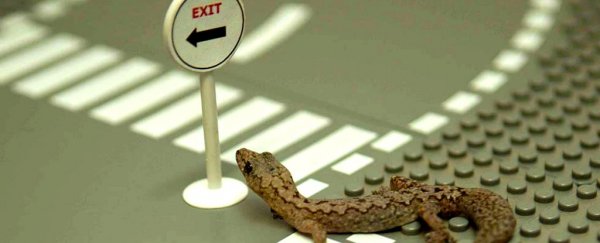Researchers have found that velvet gecko hatchlings incubated under higher temperatures are slower learners, and could have lower average survival rates than those incubated in cooler conditions.
That means with our ever-increasing global temperatures, we might be hurting oviparous animals – animals that lay eggs – in ways we didn't expect.
The researchers, from the University of Technology Sydney (UTS) in Australia, believe the study is one of the first of its kind, and lizards were a good target animal because of their spatial memory – memory associated with locations and layouts.
"Lizards are very good spatial learners. Most reptiles are on their own once they hatch so they need to be able to locate shelter quickly when fleeing from predators," said lead researcher, Jonathan Webb.
The researchers took 83 eggs and incubated around half in temperatures mimicking our current climate, and half in estimated 2050 temperatures – which will be around 4 degrees Celsius (7.2 degrees Fahrenheit) warmer.
Once 64 of the eggs had hatched, the team analysed the learning abilities of the gecko hatchlings by setting up two black shelters - one with an opening, and the other with a plastic covering.
The gecko hatchlings that were incubated in the 2050 projected temperatures weren't able to locate the refuge as fast as today's temperature hatchlings.
"Our results show that hatchlings from hot-incubated eggs were slower learners than their cold-incubated counterparts and, importantly, in the wild the slower learners had lower survival rates," said Webb.
Not being able to find shelter quickly would most likely be the difference between life and death in the wild, so this is a pretty big deal if you're a gecko.
This is only one study in one species, but if this trend turns out to be similar in other oviparous animals, it suggests that there are a lot of animals that will be affected by continued climate change.
But there might be ways around this for the geckos, as one of the researchers, Buddhi Dayananda explains:
"We don't know if females will adapt to a warming climate by choosing cooler nesting sites. It may be the only option they have to ensure their offspring can cope with changing environments."
Good luck, geckos! We're rooting for you.
The research has been published in Biology Letters.
UTS Science is a sponsor of ScienceAlert. Find out more about their research.
